Pursuing an MBBS in Nepal has become one of the top choices for Indian students who aspire to earn a medical degree abroad without facing cultural or language barriers. Nepal, being India’s neighbor, offers high-quality education, affordable tuition fees, and medical universities recognized by global bodies such as the National Medical Commission (NMC), the World Health Organization (WHO), and the World Directory of Medical Schools (WDOMS). However, many students are often unsure if clearing the NEET (National Eligibility cum Entrance Test) is mandatory to secure admission in Nepalese medical colleges. The short answer is yes, NEET is required if you plan to return and practice medicine in India. Below is a detailed guide explaining why NEET is crucial, how the admission process works, and the benefits of choosing Nepal as your MBBS destination.
Importance of NEET for MBBS in Nepal
Since 2018, the Government of India made it compulsory for Indian students to qualify for NEET to study MBBS abroad, including in Nepal. NEET serves as a single eligibility examination for students who wish to pursue medical education in India or abroad. The Medical Council of India (now NMC) clearly states that candidates who do not appear for NEET will not be allowed to sit for the FMGE (Foreign Medical Graduate Examination) or the upcoming NExT (National Exit Test), which is required to obtain a medical license in India.
Therefore, if your goal is to study MBBS in Nepal and practice medicine in India after graduation, clearing NEET is a non-negotiable requirement. Even if the university in Nepal admits you without a NEET score, you would face legal challenges while applying for a license in India. NEET ensures your medical degree is valid and recognized by Indian authorities.
Admission Criteria for MBBS in Nepal
Medical universities in Nepal have admission criteria that align closely with Indian standards, which makes the process straightforward for Indian students. Below are the main eligibility requirements:
NEET Qualification: Mandatory for Indian students who wish to practice medicine in India later.
Academic Requirements: Candidates should have passed 10+2 with Physics, Chemistry, Biology, and English as compulsory subjects and must score at least 50% in PCB. Reserved category students can get admission with 40% aggregate.
Age Requirement: The student must be at least 17 years old by the year of admission.
English Language Proficiency: Since the medium of instruction is English, students should be able to understand and communicate in English.
Valid Passport: A passport is essential to complete your admission and visa process.
These requirements ensure that students who choose Nepal for their medical studies meet global education standards and face no difficulty while applying for postgraduate studies or licensing exams anywhere in the world.
NEET’s Role in Future Career Opportunities
Clearing NEET is not just about eligibility for admission; it plays a significant role in shaping your career. After earning your MBBS degree from Nepal, you must appear for FMGE or NExT in India to practice as a doctor. Both these exams are designed to maintain uniform standards for all medical graduates, whether they studied in India or abroad.
Without NEET, you won’t be allowed to take FMGE or NExT, making it impossible to obtain a license in India. Even if you plan to work overseas, clearing NEET reflects your academic competence and enhances your profile for further opportunities like the USMLE (United States Medical Licensing Examination) or PLAB (Professional and Linguistic Assessments Board) in the UK.
Why Nepal is a Popular Choice for MBBS
Nepal offers a unique blend of quality education, cultural familiarity, and affordable costs, making it a top destination for Indian students. Here’s why:
Proximity and Easy Travel: Being a neighboring country, Nepal is easily accessible by road and air.
NMC and WHO Recognition: Most medical universities in Nepal are listed in WDOMS and recognized by the NMC, ensuring international validity of your degree.
Affordable Tuition Fees: The cost of MBBS in Nepal is much lower compared to private medical colleges in India, making it an affordable choice.
Cultural and Language Similarity: Indian students feel at home in Nepal due to shared cultural values, festivals, and food habits. English is widely used as the medium of instruction, minimizing language barriers.
High-Quality Education: Nepalese medical colleges follow a curriculum similar to Indian universities, which helps students prepare for FMGE/NExT and postgraduate entrance exams effectively.
How to Prepare for NEET for MBBS in Nepal
As NEET is mandatory for Indian students, proper preparation is essential. Here are a few tips:
Start Early: Begin NEET preparation during your 11th and 12th grade to have a strong foundation in Physics, Chemistry, and Biology.
Use NCERT Books: NEET is largely based on NCERT, so mastering these books should be a priority.
Practice Mock Tests: Take regular mock tests to assess your performance and identify weak areas.
Enroll in Coaching if Needed: Many students join coaching institutes for structured learning and guidance.
Time Management: Create a balanced study schedule and revise frequently to avoid last-minute stress.
Admission Process for MBBS in Nepal
Once you clear NEET, applying for MBBS in Nepal is simple and transparent. Here is a step-by-step process:
Research and Shortlist Universities: Choose NMC-approved and WDOMS-listed universities.
Application Submission: Fill out the application form of the chosen medical college or university.
Document Verification: Submit documents like your passport, academic certificates, and NEET scorecard.
Admission Letter: After approval, you’ll receive an admission letter from the university.
Visa Process: Apply for a student visa (if required) and make travel arrangements.
Orientation and Enrollment: Attend orientation programs and start your MBBS classes.
Life as an MBBS Student in Nepal
Studying MBBS in Nepal offers Indian students an environment similar to their home country. Hostel facilities are well-maintained, with separate accommodations for boys and girls, Indian-style food, and 24/7 security. Nepal also provides ample clinical exposure through its well-equipped hospitals, giving students the opportunity to gain hands-on experience.
The cost of living is reasonable, ranging between ₹10,000 to ₹15,000 per month, which covers accommodation, food, and other daily expenses. The supportive environment, combined with the friendly local population, makes Nepal an ideal destination for Indian students.
Conclusion
To summarize, if you’re planning to study MBBS in Nepal and practice medicine in India, clearing NEET is mandatory. It is not only a requirement set by the National Medical Commission but also a stepping stone for your future medical career. Nepal provides high-quality medical education at an affordable cost, making it an attractive choice for Indian students. By clearing NEET and choosing an NMC-approved medical university in Nepal, you can achieve your dream of becoming a doctor while studying in a culturally familiar and supportive environment.







